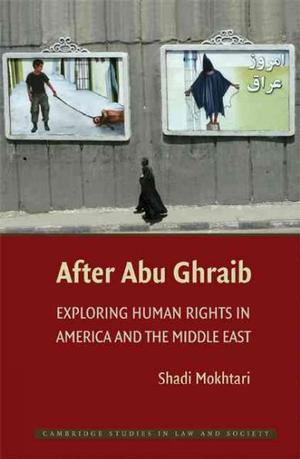 Reviewed: After Abu Ghraib: Exploring Human Rights in America and the Middle East, By Shadi Mokhati, (Cambridge University Press, 2011).
Reviewed: After Abu Ghraib: Exploring Human Rights in America and the Middle East, By Shadi Mokhati, (Cambridge University Press, 2011).
In the book Abu Ghraib: Exploring Human Rights in America and the Middle East, author Shadi Mokhtari describes how the human rights violations at Abu Ghraib, Guantanamo and other secret prisons have created a new level of consciousness regarding rights and justice, while simultaneously providing the United States with a justification for military intervention in Middle Eastern countries. With human rights described as “a site of struggle,” Mokhtari portrays the opposing paradigms of power impersonated by West and East.
Under a banner of freedom and justice, Washington defended its recent interventions in the Middle East by citing human rights violations committed by rulers in the region. Through a call toward establishing western democracy in the Middle East, the US has consolidated its position as an international guardian of human rights. In assessing human rights through the dynamics of national law, the US imposed its hierarchy over international law.
Reminiscent of Edward Said’s Orientalism, Mokhtari argues that post September 11th human rights discourse is rooted in an imaginary consciousness in which the US is never a perpetrator. Meanwhile, the Middle East is portrayed as evil and unable to comprehend the importance of human rights. The US has enhanced its own image through the dehumanization of the Middle East, thus rendering negligible any violations of human rights in the region committed by the US.
Human rights violations committed by the US in recent conflicts were classified as necessary measures against terrorists; torture was described as a counter resistance interrogation technique and extraordinary rendition of suspects. Dick Cheney’s justification of torture was “a new conflict” which necessitated new methods of interrogation. These torture techniques, which cast the US into the role of a superior mediator in human rights conflicts, aided the US in framing conflicts in the Middle East within its own warped human rights discourse. By eliminating the concept of human rights for detainees in cases of torture claims, the US has determined pre-emptive measures as both legal and morally acceptable.
Such pre-emptive torture measures were adopted by US soldiers in Iraq, echoing President George W. Bush’s justification of war disguised under a “service of freedom.” While the US waged brutal wars in Afghanistan and Iraq, Washington shifted the limelight from US atrocities in the war and on the dangers posed by terror suspects.
This strategy involved giving US soldiers the authority to kill, torture and detain any person suspected of enmity, whether by suspicion or by association, however remote. A high percentage of detainees in Guantanamo and Abu Ghraib were traded and sold by militias operating in Pakistan and Iraq, shedding doubt over the rigorous processes which the US claims were applied in screening detainees held in these prisons.
The image of the US as savior was further deteriorated with the publication of photos of torture in Abu Ghraib, bringing about a new political consciousness in US and Middle Eastern citizens. The violations against these prisoners at the hands of the world’s superpower brought a new wave of criticism and resistance.
Mokhtari argues that the controversy of Abu Ghraib represented subjugation which had been previously acknowledged but still retained vestiges of democratic rhetoric. However, citizens of invaded countries have delved further into defining the philosophy of human rights, distinguishing between power, justice and human rights discourse. In Universal Human Rights in Theory and Practice (1989), Professor Jack Donnelly states “… the West can also be blamed for creating the conditions that required human rights in order to guarantee human dignity.”
Mokhtari’s geopolitical analysis gives readers the opportunity to discern between the various debates within the human rights discourse while acknowledging that there is no government which fully adheres to human rights. She looks at the struggle for human rights in both the seat of government power and among citizens groups, highlighting the contradiction of the US simultaneously committing major human rights violations and remaining an international authority on human rights standards.
Ramona Wadi is a freelance writer living in Malta. Visit her blog here.
